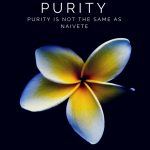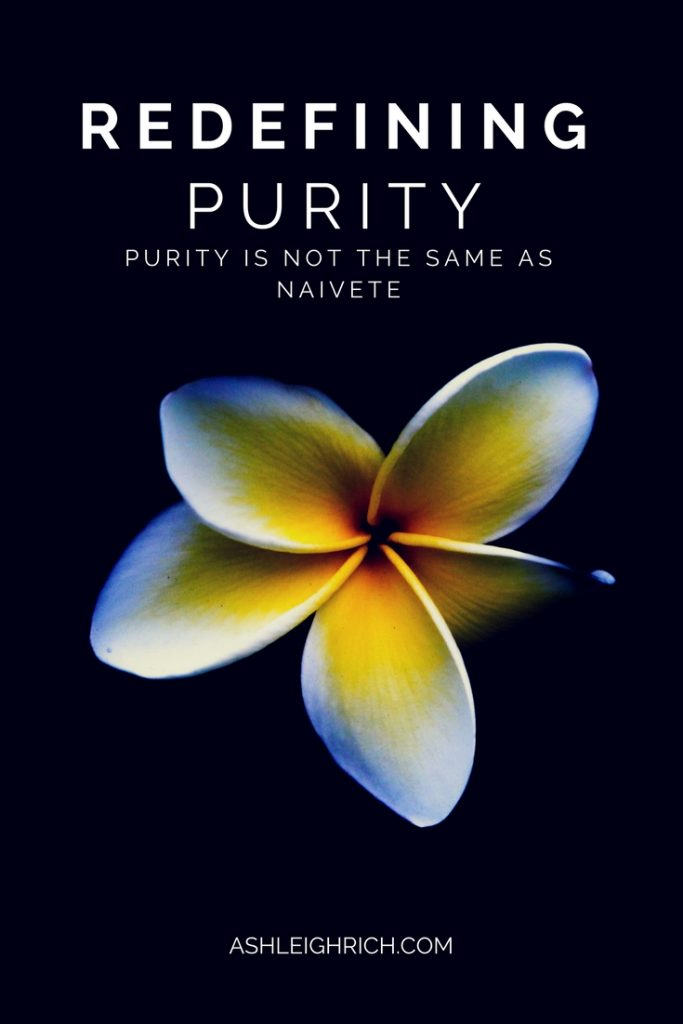Being pure does not mean you have to live in a bubble. Last week, my blog post was about how purity is a process, not some point you can’t cross. If that’s true, that means that even if you know things or have experienced things that maybe you shouldn’t, that doesn’t necessarily make you less pure.
The Wrong Idea
There’s this idea out there, especially among some Christians (and especially, especially among Christian, homeschooled/sheltering type parents) that if we protect our kids and ourselves from the world, we can keep them pure. If they never learn what sex is, they can’t have it. If they never hear strong language, they can’t use it. That’s not really true and it rarely (if ever works). After all, have you ever seen one of those shows where Amish kids go crazy?
You can keep you and your kids naïve, but being naïve is not the same as being pure. Equating naiveté with being pure is the same as equating purity with virginity. You end up with a point that can’t be crossed and if you cross it, too bad for you, you’ll never be that pure again.
There’s a Time for Naiveté
Being naïve is really just being ignorant. You don’t know what you don’t know. We all start out naïve, and to some extent, that’s a good thing. You have grow up a little before you can handle the knowledge of some things in life. Knowledge requires responsibility.
That’s why we try to keep young children from learning too much about sex and violence. They don’t have the ability to process those things. Having too much knowledge without the capacity to process it can be really damaging. When children are exposed to porn or violence, there are often serious consequences and damages in that child’s life.
However, we have to make sure we (and our kids) have enough knowledge at every point in life to be able to recognize sin and wrongdoing. We tell kids that they should tell their parents if someone ever touches them in certain places. We tell them this so that predators don’t take advantage of their naiveté.
You Have to Know What Sin Is to Avoid It
As you grow, at appropriate times, you should be exposed to the evil and temptations of the world, otherwise you’ll have no knowledge of if they’re wrong or how to fight them if they are. To some extent, that’s what the Bible is for. It tells us what things are sinful and wrong and should be avoided.
In Romans 7:7, Paul talks about this. He says, “I would not have known what sin was had it not been for the law. For I would not have known what coveting really was if the law had not said, ‘You shall not covet.’” Without the law, Paul would be naïve when it comes to coveting. The law shows him this is what coveting is and it’s wrong. You shouldn’t do it. Without that knowledge, Paul could potentially be doing something sinful without knowing it.
That’s why church is so important too. At church, we meet with others and through sermons, classes, and small groups focusing on the Bible, we (hopefully) discuss what sorts of things please God and what sorts of things don’t. We work together with one another and the Holy Spirit to do the things that are pleasing and avoid the things that aren’t.
We need to talk about sin because otherwise we won’t know what things are sinful. Teens and young adults and all adults really should be taught that sex outside of marriage is bad and that pornography is damaging (among other things). Otherwise, we’ll just go along with what the world says about those things. To have those conversations, sometimes we have to “ruin” someone’s naiveté. I think that’s okay.
We Have to Know So We Don’t Conform
Romans chapter 12 talks about how we are not to be “conform[ed] to the pattern of this world, but be transformed by the renewing of [our] mind[s].” In this passage, Paul doesn’t tell us that we are to protect our minds against the world at any cost. He doesn’t tell us we all need to move to a crazy Christian commune where we’re never exposed to sin or sinful people.
No, instead he tells us not to be conformed to what the world tries to make us into. We have to know how the world is trying to conform us in order to keep from conforming. That might mean having some uncomfortable, naiveté-ruining conversations. That doesn’t ruin someone’s purity however, it puts them on the path toward it.
The transformation Paul talks about is part of the process of purity. God takes whatever garbage we have in our minds (and even those aforementioned sheltered homeschool kids have garbage in there, trust me) and he begins to throw it out and replace it with holy and pure thoughts and actions.
He doesn’t do this overnight. It’s a lifelong process of learning and growing and becoming more and more like Christ. Even a mature believer like Paul still struggled with this transformation process. Just read the description of his struggle in Romans 7:-21-25.
Though this process is a struggle and is never completed this side of heaven, this struggle is what purity is really about. It’s about freely choosing to live the way God desires, not because we don’t know any other way, but because we’ve seen the other options and trust that God’s way is best.
Knowledge Can Make Purity Harder
Now, that doesn’t mean that we should just expose ourselves to whatever we want and trust that the process of purity will cleanse us. The truth is sometimes knowledge or experience can make purity harder. Sometimes there are consequences to knowledge and experience. God can still transform us regardless of these things, but they can make the process a little more difficult.
If you’ve had sex, it’s hard to go back to not having sex. After all, sex was meant to be an addictive thing to keep a husband wife together. If you’ve seen porn, Satan has more to work with to pull you into lust and fantasy. There is some value in not exposing yourself to every sin and temptation out there.
Living in the World, but Not Of It
However, there is also a limit to how much we can protect ourselves without living in a bubble. We are called to live in the world. There are sinful people in the world and we can’t protect ourselves from every sin that they cause or that they expose us to. At the same time, we are not called to be of this world, we are called to live for God. That means sometimes we should choose not to watch or listen to or do certain things.
Pay attention to how things are affecting you. If you find that you think about sex too much after watching Game of Thrones (which PS I really like ,but admittedly contains a lot of sex scenes), you probably should avoid watching Game of Thrones or you should get one of those movie/show editing programs/systems like VidAngel.
In order for us to go through the process of purity, we have to recognize that it’s not about what we know or what we’ve done, it’s about what we’re choosing to do now and how we’re using our knowledge. Are we choosing to please God or are we choosing to please ourselves or someone else? That’s the ultimate indicator of purity.
Photo by Jeremy Bishop on Unsplash



Even the most innocent of things can affect each of us in a different way
That’s true. That’s why we have to be very self aware. We shouldn’t put ourselves in tempting situations. However, we also can’t every completely protect ourselves from every temptation either. We have to rely on the Holy Spirit to help guide us and choose the path of purity. Thanks fro reading!
Interesting read! Important to note though. I don’t have kids, but I can imagine that balancing telling kids about the troubles of the world at the right time without damaging them is awfully tricky! It’s something that needs to be talked about though, thanks for posting!
I don’t have kids either. It’s actually terrifying to think about trying to balance telling kids appropriate things without scaring or scarring them. Even as an adult though, the balance is tricky. How much should we be in the world and how much should we avoid/be different. It’s a tricky thing, but we have to think it through. Thanks for reading!